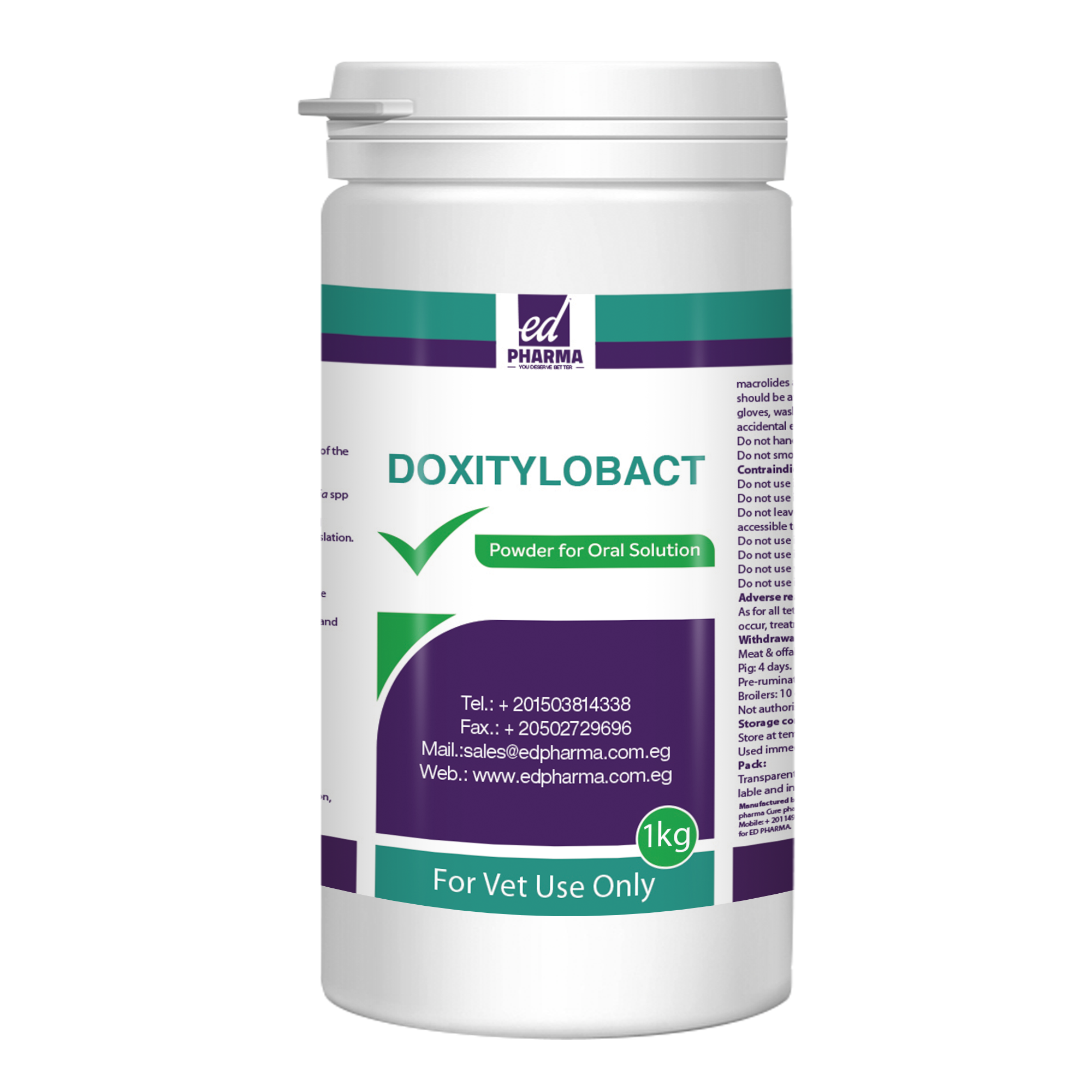DOXITYLOBACT
DOXITYLOBACT
Doxitylobact
(Powder for Oral Solution)
(For vet. use only)
DOXITYLOBACT
Each 100 gm contain:
Accordion Sample DTylosin (as tartrate) 50 gm.
Doxycycline (as hydrochloride) 20 gm.
Accordion Sample DTylosin (as tartrate) 50 gm.
Doxycycline (as hydrochloride) 20 gm.
Accordion Sample D Tylosinis a macrolide antibiotic that acts by interfering protein synthesis by reversibly binding to the 50S subunit of the ribosome.
Tylosin is active against most aerobic and anaerobic gram-positive bacteria.
In general, macrolides are not active against gram-negative bacteria, but some strains of Pasteurella, Haemophilus, and Neisseria spp may be sensitive.
Macrolides are active against atypical mycobacteria, Mycobacterium, Mycoplasma, Chlamydia, and Rickettsia spp but not against protozoa or fungi, Bacteroides fragilis strains are moderately susceptible to macrolides.
Doxycycline is a Tetracycline antibiotic thatacts by reversible binding to the bacterial 30S ribosomal subunit, and specifically at the aminoacyl-tRNA receptor site on the mRNA ribosomal
complex, thus preventing ribosomal translation.
Doxycyclinehas broad spectrum activity inhibiting both aerobic and anaerobic gram-positive and gram-negative bacteria, mycoplasmas, chlamydiae, rickettsias and some protozoa.escription
Broiler chickens: for the treatment of airsacculitis caused by Mycoplasma synoviae and chronic respiratory disease caused by Mycoplasma gallisepticum.
Pigs: for the treatment of enzootic pneumoniacaused by Mycoplasma hyopneumoniae and Pasteurellamultocida, and scours caused Lawsoniaintra cellularis.
Pre-ruminating calves: for the treatment pneumonia caused by mycoplasmata and Pasteurellamultocida.
Broiler chickens, pigs and pre-ruminating calves.
Route of Administration: Orally via drinking water.
Dose of whole product:
Broiler chickens: 1 gm of the product / 1 liter drinking water daily, for 5 days.
Pigs: 50 mg of the product / kg bw daily, for 3 to 10 days.
Pre-ruminating calves: 1 gm of the product /12.5 kg bw twice daily, for 7 to 14 days.
– Tylosin may induce irritation, macrolides, such a tylosin, may also cause hypersensitivity (allergy) following injection, inhalation, ingestion or contact with skin or eye, Hypersensitivity to tylosin may lead to cross reactions to other macrolides and vice versa, allergic reactions to these substances may occasionally be serious and therefore direct contact should be avoided.
– To avoid exposure during preparation of the medicated feed, wear overalls, safety glasses, impervious gloves, wash hands after use.
– In the event of accidental skin contact, wash thoroughly with soap and water.
– In case of accidental eye contact, flush the eyes with plenty of clean, running water.
– Do not handle the product if you are allergic to macrolides or tetracyclines.
– Do not smoke, eat or drink while handling the product.
– To avoid exposure during preparation of the medicated feed, wear overalls, safety glasses, impervious gloves, wash hands after use.
– In the event of accidental skin contact, wash thoroughly with soap and water.
– In case of accidental eye contact, flush the eyes with plenty of clean, running water.
– Do not handle the product if you are allergic to macrolides or tetracyclines.
– Do not smoke, eat or drink while handling the product.
– Do not use in laying hens producing eggs for human consumption.
– Do not use in cattle producing milk for human consumption.
– Do not leave or dispose of water containing tylosin tartrate where it may be accessible to either animals not under treatment or to wildlife.
– Do not use in known cases of hypersensitivity to tylosin or other macrolides.
– Do not use in case of known hypersensitivity to tetracyclines or to the excipient.
– Do not use when tetracycline resistance has been detected in the herd/flock due to the potential for cross- resistance.
– Do not use in animals with impaired liver or kidney functions.
– Do not use in cattle producing milk for human consumption.
– Do not leave or dispose of water containing tylosin tartrate where it may be accessible to either animals not under treatment or to wildlife.
– Do not use in known cases of hypersensitivity to tylosin or other macrolides.
– Do not use in case of known hypersensitivity to tetracyclines or to the excipient.
– Do not use when tetracycline resistance has been detected in the herd/flock due to the potential for cross- resistance.
– Do not use in animals with impaired liver or kidney functions.
As for all tetracyclines, on rare occasions allergic reactions and photosensitivity may occur.
If suspected adverse reactions occur, treatment should be discontinued.
If suspected adverse reactions occur, treatment should be discontinued.
Meat & offal
Pig: 4 days.
Pre-ruminating calves: 14 days.
Broilers: 10 days.
Not authorised for use in birds producing eggs for human consumption.
Pig: 4 days.
Pre-ruminating calves: 14 days.
Broilers: 10 days.
Not authorised for use in birds producing eggs for human consumption.
Store at temperature not exceeding 30 ⁰C in a dry place.Used immediately after opening and reconstitution.
Transparent plastic (LDPE) bag containing 20, 25, 30, 50, 75, 100, 150, 200, 250, 300, 500, 750,
1000 gm of the product in (HDPE) plastic jar with (HDPE) cap with outer label and insert leaflet.
